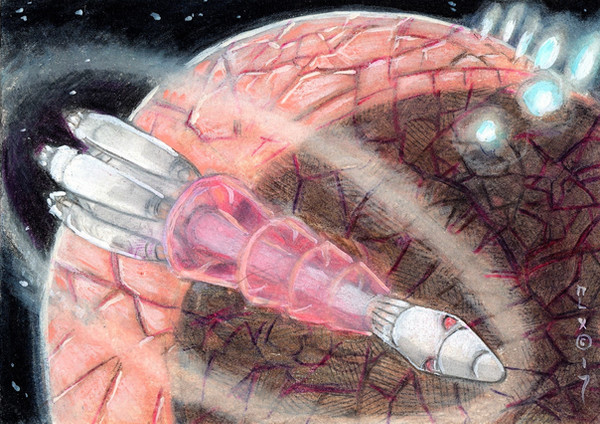HOME | DD
 LEXLOTHOR — Arrival at Europa
LEXLOTHOR — Arrival at Europa

#jupiter #moons #europa #sciencefiction #spacecraft #spaceexploration #spaceship
Published: 2017-02-11 18:03:36 +0000 UTC; Views: 869; Favourites: 18; Downloads: 6
Redirect to original
Description
Jupiter's moon Europa is becoming ever more interesting to planetary scientists. Recent observations have indicated that there may be active geysers on this world such as those on the Saturnian moon Enceladus. Tidal friction with Jupiter has resulted in a vast subsurface ocean of liquid H2O. The surface of the moon is entirely formed of rock hard ice resulting in a global icepack that is in constant motion. Pressure ridges bring up slush from deeper in the moon. The reddish brown colors at these cracks strongly suggests the presence of complex organic molecules.NASA is developing plans for a dedicated Europa robotic orbiter mission. Perhaps later in this century humans will visit this moon. There are some technological hurdles to be overcome. One problem is the high levels of radiation that occur so close to Jupiter. I have equipped this exploratory spacecraft with a magnetic field generator to ward off some of this radiation.
In the movie "2001: a Space Odyssey" the spacecraft Discovery 1 was originally designed to have extensive radiators to dispel heat from the fusion engine. These were dropped from the model that was seen in the film. My spacecraft has nested conical radiators that are glowing from the recent orbital insertion burn.
art & text (c) John P. Alexander
2.5" x 3.5" art card rendered in Prismacolor pencils, Prismacolor & Tombow markers & acrylic paint
Related content
Comments: 4

The malting of the ice of that moon would make for some fine Thunderbirds special effects.
👍: 0 ⏩: 0

Nice. Is this a manned ship, or an automated one?
👍: 0 ⏩: 1

Manned, otherwise the radiation shielding would be superfluous.
👍: 0 ⏩: 1

Yeah, I guess it would take a lot less shielding to protect any vulnerable electronics.
👍: 0 ⏩: 0
























